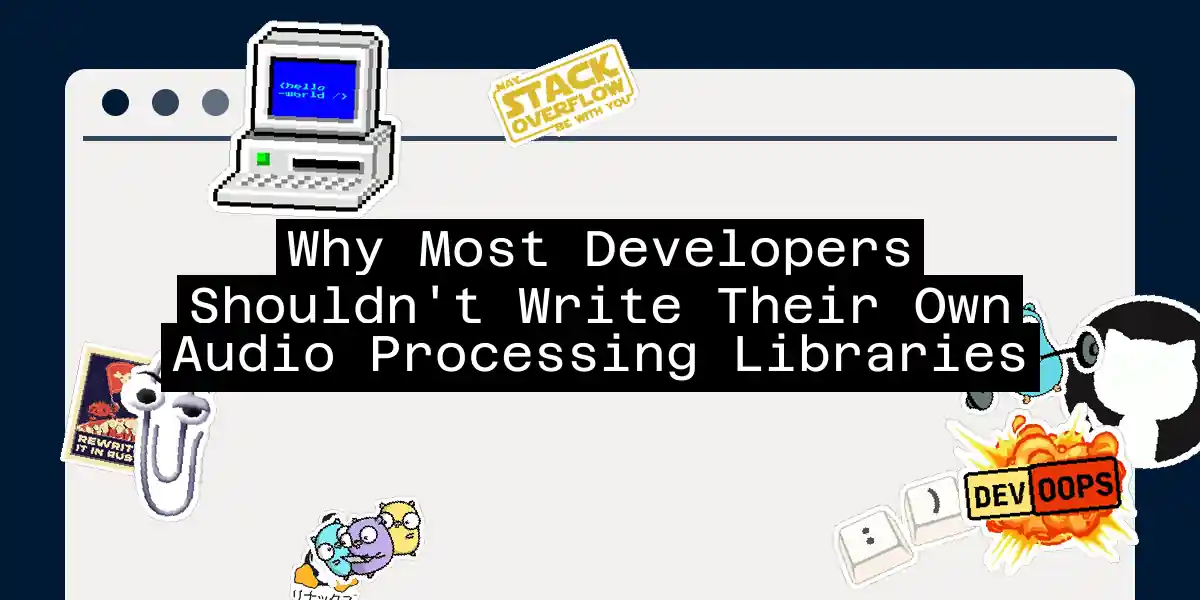The Perils of Rolling Your Own Audio Library
When it comes to software development, there’s a certain allure to writing everything from scratch. It’s like the ultimate DIY project, where you get to be the architect, engineer, and carpenter all rolled into one. However, when it comes to audio processing libraries, this approach can quickly turn into a nightmare. Here’s why most developers should think twice before embarking on this journey.
The Complexity of Audio Processing
Audio processing is not just about playing sounds; it’s a delicate dance between your application, the operating system, and the hardware. One of the most critical aspects is avoiding buffer underruns, which can lead to audio stuttering or silence—essentially the audio equivalent of a black screen during frame drops in graphics.
To avoid these underruns, audio processing must be done on a separate thread, ensuring that it doesn’t get blocked by other system tasks. This means no memory allocation or deallocation on the audio thread, as these operations can pause the thread for unpredictable amounts of time, leading to underruns.
The Time and Effort Involved
Creating an audio library that meets these stringent requirements is no trivial task. It involves deep understanding of threading, synchronization, and the intricacies of how the operating system handles audio requests. For instance, the audio thread must produce batches of samples at a consistent rate, and any delay in processing these samples can lead to noticeable issues.
Given the complexity, it’s clear that writing an audio processing library from scratch is a significant undertaking. It’s not something you can whip up over a weekend or even in a few weeks. It requires extensive testing, optimization, and debugging to ensure it works seamlessly across different hardware configurations and operating systems.
The Pitfalls of Custom Implementation
When deciding whether to write your own library or use an existing one, several factors come into play. Here are a few key considerations:
- Complexity: Audio processing is inherently complex. If you’re dealing with something as intricate as real-time audio processing, using a well-tested library is often the safer bet.
- Speed: Custom implementations can be slow, especially if you’re not an expert in the field. Optimizing audio code for performance is a challenging task that requires significant expertise.
- API and Documentation: A good library should have a simple, well-documented API. If you’re writing your own, you’ll need to invest time in creating and maintaining this documentation, which can be a daunting task.
- Dependencies and Licensing: Many audio libraries have dependencies and licensing constraints. For example, some libraries might be under licenses that are incompatible with your project’s requirements.
The Benefits of Using Existing Libraries
So, why should you use existing audio processing libraries? Here are a few compelling reasons:
- Proven Track Record: Existing libraries have been tested and optimized by experts over years. They have already solved many of the problems you’d encounter when writing your own library.
- Community Support: Popular libraries often have active communities and extensive documentation. This means you can find help quickly if you encounter any issues.
- Flexibility and Maintainability: Good libraries are designed to be flexible and maintainable. They allow you to use only the parts you need, reducing the overall complexity of your project.
A Personal Anecdote
I recall a project where we decided to roll our own audio library because we thought it would be “fun” and “educational.” What followed was a series of late nights, endless debugging sessions, and a lot of hair pulling. We eventually realized that our custom implementation was not only slower but also more prone to errors than the existing libraries we could have used.
Conclusion
Writing your own audio processing library can be a tempting idea, but it’s a path fraught with challenges. Unless you have a very specific requirement that existing libraries cannot meet, it’s generally better to use what’s already available. These libraries have been battle-tested, optimized for performance, and are supported by active communities.
So, the next time you’re tempted to write your own audio library from scratch, remember: it’s not just about the code; it’s about the time, effort, and sanity you’ll save by using something that’s already proven to work.
In the world of software development, sometimes the best decision is to stand on the shoulders of giants rather than trying to build your own mountain from scratch. Happy coding
